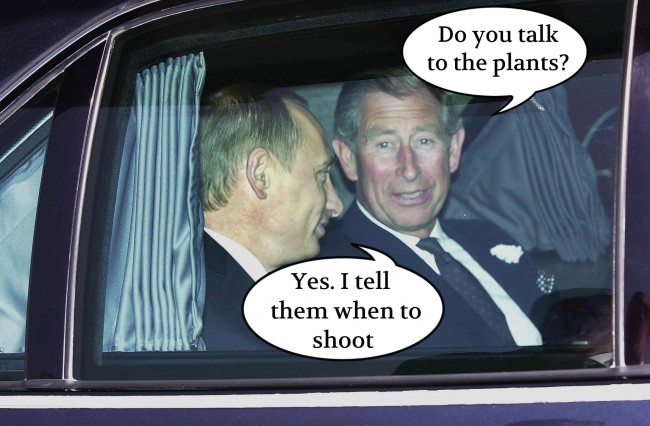Prince Charles Know His History: Vladimir Putin Is Doing A Hitler
WHAT are we to make of the news that Prince Charles likened Vladimir Putin to Adolf Hitler? Charles didn’t make his views known in a public address. He was, as the BBC put it, “privately conversing” in Nova Scotia, Canada, where one day he hopes to be head of State. Charles told a woman whose relations were murdered in the Holocaust: “And now Putin is doing just about the same as Hitler.”
A senior Russian diplomatic source tells the Telegraph:
“We are seeking clarification [from the FCO] at a working level. It’s not clear if it is an official position. The response from Clarence House is it was a private talk. We hope there is nothing behind it. But it is unclear to us: what does it mean? He is the future king, after all… It is very serious. Every family in our country lost someone in that war.”
Over 20millions Russian died in World War 2.
As for it being an official position, what does that mean? Charles has no great power. All he does is talk. All he has are opinions.
Labour party MP Mike Gapes says Charles should be mute. “In constitutional monarchy policy and diplomacy should be conducted by parliament and government. Monarchy should be seen and not heard,” he tweeted.
He can’t speak? Gapes added:
“If you are heir to throne or monarch what you say matters. Normal ‘free speech’ argument not relevant.”
Charles is now a non-human, a thing not allowed human rights.
Deputy Prime Minister Nick Clegg does not agree with Gapes:
“I have never been of this view that if you are a member of the royal family somehow you have to enter into some Trappist vow of silence. I think he is entitled to his views. But I don’t know whether those were his views because I just don’t think providing a running commentary on what were private conversations is useful to anybody.”
David Aaronovitch takes a view in the Times:
Hitler’s pretexts for the annexation of the Czech Sudetenland in 1938 and the invasion of Poland in 1939 were similar…On September 1, 1939, Hitler made a speech announcing war with Poland, which began with a long prologue of justification concerning the Free City of Danzig, a city with a large majority of Germans and a Nazi government, and the “corridor” of Polish land that separated it from the Reich. “Danzig was and is a German city! The corridor was German and is German! These regions owe their cultural development exclusively to the German Volk . . . Danzig was torn from us.”
On March 18 this year Mr Putin announced the annexation of Crimea to a selected audience at the Kremlin. In a speech punctuated by standing ovations and TV cutaways to women crying with joy, he began by telling them: “Crimea has always been an inseparable part of Russia. This firm conviction is based on truth and justice and was passed from generation to generation, over time, despite all the dramatic changes our country went through during the entire 20th century.”
It was the Treaty of Versailles that robbed Germany of the corridor and divided its Volk. It was the post-1989 chaos that finally deprived Russia of Crimea. “Millions of people went to bed in one country and awoke in different ones, overnight becoming ethnic minorities in former Union republics,” said the Russian president, “while the Russian nation became one of the biggest, if not the biggest ethnic group in the world to be divided by borders.”
In 1938 and 1939 that claim was made in Germany…
In Crimea and elsewhere in Ukraine, said Mr Putin, “time and time again attempts were made to deprive Russians of their historical memory, even of their language and to subject them to forced assimilation.”
Unsurprisingly, the citizens of Crimea “turned to Russia for help in defending their rights and lives, in preventing the events that were unfolding and are still underway in Kiev, Donetsk, Kharkov and other Ukrainian cities”.
Help was forthcoming because “no honourable great power could calmly tolerate such a state of affairs for long”, as Hitler put it. Or, as Mr Putin said: “Naturally, we could not leave this plea unheeded; we could not abandon Crimea and its residents in distress. This would have been betrayal on our part.”
The Guardian ignores that and simply calls it a “gaffe”.
But it wasn’t. He said what he meant. He made no faux pad. His was not a social blunder. He said what he meant. And it’s a view not entirely unsupported by historical fact.
Posted: 22nd, May 2014 | In: Politicians, Reviews, Royal Family 0 Comments | TrackBack | Permalink



